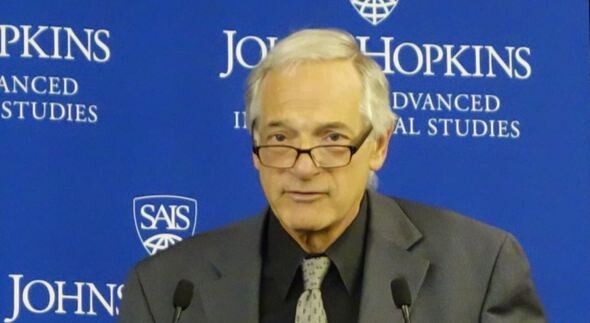hankyoreh
Links to other country sites 다른 나라 사이트 링크
Robert Gallucci says “the North Korean case is not like fine wine”

Calls are growing louder in the US for Washington abandon its focus on sanctions in North Korea policy and negotiate with Pyongyang.
With the situation growing increasingly pronounced since North Korea‘s fifth nuclear test, many are now watching to see if the next administration will bring a shift in North Korea policy.
Speaking at a discussion on Northeast Asia issues organized jointly in Washington on Oct. 4 by the Johns Hopkins University Paul H. Nitze School of Advanced International Studies (SAIS) and South Korea’s Presidential Committee for Unification Preparation (PCUP), Robert Gallucci, a former US State Department special envoy on the North Korean nuclear issue, stressed the importance of negotiations as the first means of resolving the currently deadlock in North Korea issues.
“If they work properly, negotiations are better than war,” Gallucci said.
Gallucci was the top US delegate for the 1994 Geneva Agreed Framework between North Korea and the US.
“We could continue just as we are now. We could continue with what might be called some version of containment, where we have a sanctions regime,” Gallucci continued.
“But . . . as we do contain the North, we also watch the situation get worse,” he warned.
“The North Korean case is not like fine wine. It doesn‘t get better with age. With each passing month and year, we look a nuclear weapons capability that grows qualitatively and quantitatively,” he added.
Gallucci went on to say the leaders in Pyongyang “think nuclear weapons will give them as deterrent to US efforts at regime change.” He also suggested they may be willing to negotiate abandoning their nuclear ambitions if there is a definite guarantee on the regime’s survival.
“While it may be difficult to negotiate with North Korea, there is no better option,” he added, arguing that a preemptive strike or other measures would only make the situation worse.
In terms of the “carrots” that could be offered to Pyongyang in the negotiation process, Gallucci said Washington would have to have discussions with Seoul on key elements in the South Korea-US alliance such as joint military exercises.
Sogang University Graduate School of International Studies professor Kim Jae-chun, who is visiting the US along with PCUP civilian vice chairperson Chung Jong-wook, also described a “different” mood in the US during a meeting the same day with foreign correspondents in Washington.
“In meeting with US experts, I’ve gotten the sense there are more people there than in South Korea who think we should have dialogue with North Korea if certain conditions are met,” Kim said.
“Some experts have said we should pursue dialogue if North Korea declares a moratorium [on nuclear testing and missile launches],” he added.
“I had the feeling South Korea could end up like the proverbial dog left staring at the roof where it chased the chicken [if the differences continue],” Kim said. “I think to myself, how about at least discussing different scenarios internally?”
A number of other US figures have previously called for negotiations with Pyongyang in interviews or opinion pieces, including former US Secretary of Defense William Perry, Woodrow Wilson Center president Jane Harman and coordinator James Person, US nuclear expert Siegfried Hecker, and Arms Control Association executive director Daryl Kimball.
By Yi Yong-in, Washington correspondent
Please direct questions or comments to [english@hani.co.kr]

Editorial・opinion
![[Column] Park Geun-hye déjà vu in Yoon Suk-yeol [Column] Park Geun-hye déjà vu in Yoon Suk-yeol](https://flexible.img.hani.co.kr/flexible/normal/500/300/imgdb/original/2024/0424/651713945113788.jpg) [Column] Park Geun-hye déjà vu in Yoon Suk-yeol
[Column] Park Geun-hye déjà vu in Yoon Suk-yeol![[Editorial] New weight of N. Korea’s nuclear threats makes dialogue all the more urgent [Editorial] New weight of N. Korea’s nuclear threats makes dialogue all the more urgent](https://flexible.img.hani.co.kr/flexible/normal/500/300/imgdb/original/2024/0424/7317139454662664.jpg) [Editorial] New weight of N. Korea’s nuclear threats makes dialogue all the more urgent
[Editorial] New weight of N. Korea’s nuclear threats makes dialogue all the more urgent- [Guest essay] The real reason Korea’s new right wants to dub Rhee a founding father
- [Column] ‘Choson’: Is it time we start referring to N. Korea in its own terms?
- [Editorial] Japan’s rewriting of history with Korea has gone too far
- [Column] The president’s questionable capacity for dialogue
- [Column] Are chaebol firms just pizza pies for families to divvy up as they please?
- [Column] Has Korea, too, crossed the Rubicon on China?
- [Correspondent’s column] In Japan’s alliance with US, echoes of its past alliances with UK
- [Editorial] Does Yoon think the Korean public is wrong?
Most viewed articles
- 1‘We must say no’: Seoul defense chief on Korean, USFK involvement in hypothetical Taiwan crisis
- 2Will NewJeans end up collateral damage in internal feud at K-pop juggernaut Hybe?
- 3[Column] Park Geun-hye déjà vu in Yoon Suk-yeol
- 4Why Korea shouldn’t welcome Japan’s newly beefed up defense cooperation with US
- 5Thursday to mark start of resignations by senior doctors amid standoff with government
- 6N. Korean hackers breached 10 defense contractors in South for months, police say
- 7[Guest essay] The real reason Korea’s new right wants to dub Rhee a founding father
- 8[Column] ‘Choson’: Is it time we start referring to N. Korea in its own terms?
- 9Kim Jong-un expressed ‘satisfaction’ with nuclear counterstrike drill directed at South
- 10[Editorial] New weight of N. Korea’s nuclear threats makes dialogue all the more urgent